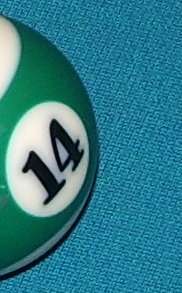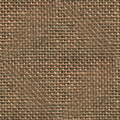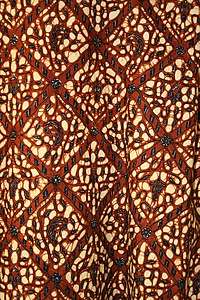Baize

Baize is a coarse woollen (or in cheaper variants cotton) cloth.
Introduction of baize into England
A mid-17th century English ditty (a short, simple popular song)—much quoted in histories of ale and beer brewing in England—refers to 1525 as the year:
Hops, heresies, bays, and beer;
Came into England all in one year.
Heresies refers to the Protestant Reformation, while bays is the Elizabethan spelling for baize.[1]
Usage
Baize is most often used on snooker and billiards tables to cover the slate and cushions, and is often used on other kinds of gaming tables such as those for blackjack, baccarat, craps and other casino games. It is also found as a writing surface, particularly on 19th century pedestal desks.
The surface finish of baize is not very fine (and thus increases friction, perceptibly slowing the balls down, from a player's perspective). Baize is available with and without a perceptible nap. Snooker, in which understanding of the effects of the nap is part of the game, uses the nappy variety, while pool (pocket billiards) and carom billiards use the napless type. Table baize is available in many grades, with pool halls preferring smooth, "fast" worsted woollen baize, while rather more fuzzy, "slow" cloth is commonly used for bar/pub pool.
For gaming use, baize is traditionally dyed green, in mimicry of a lawn (see Cue sport, "History"), hence the common phrase "the green baize", a metonym for snooker itself. Today, a wide variety of colours are now used for tables (for other uses such as clothing it has always been available in other colours).
“I have covered my old carpet with a handsome green baize, and every stranger who comes to see me, I observe, takes it for granted that I have a rich carpet under it."[2]
Idioms and catchphrases
- "Let's get the boys on the baize!" has been a catchphrase of BBC TV snooker presenter Rob Walker since 2008.[3]
- At one time, "the green baize door" (a door to which cloth had been tacked to deaden noise) in a house separated the servants' quarters from the family's living quarters;[4] hence the phrase's usage as a metonym for domestic service.


See also
References
- ↑ Life in Elizabethan England; "Good English Ale"; accessed 20 February 2011.
- ↑ From novel by Maria Edgeworth (1968-1849), "Belinda" published 1801.
- ↑ Mark Reason, "Ronnie O'Sullivan greater than Tiger Woods", Daily Telegraph 4 May 2008. Accessed 5 May 2014.
- ↑ See Graham Greene, The Fallen Idol (originally The Basement Room; Penguin; 1976; page 125)
External links
| Look up baize in Wiktionary, the free dictionary. |
| Wikimedia Commons has media related to Baize. |



.svg.png)